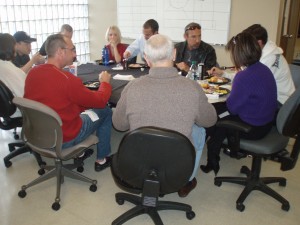We’re thinking too much alike. Stop it.
There’s nothing uglier for a family, a workplace, a social club or any type of group than for members to get stuck in the trap of all thinking the same thing all the time.
Groups are useful and necessary in many situations. Handling a project or something in a group is good because this setup often solves problems that individuals cannot.
 But some groups can create a mess. The cover-up of child sex abuse at Penn State is one example.
But some groups can create a mess. The cover-up of child sex abuse at Penn State is one example.
People attached to the football program tried so hard to protect the glory of the university image, the football team, and the revered coaches Jerry Sandusky and Joe Paterno. Instead, children suffered at the hands of Sandusky. He was sentenced with 30 to 60 years in prison after being found guilty on 45 counts related to sexually assaulting children. But it took a long time for the case to reach courts because of the coverups at the university.
Beware the groupthink.
You’ve seen it before in a group. Everyone agrees with something so strongly that nothing ever changes. Although some people might disagree privately, they all keep going through the motions in order to protect the group.
Researcher and psychologist Irving Janis states that groupthink is the direct result of cohesiveness in groups. Cohesiveness is the degree of mutual interest among members.
Janis does not deny the potential value of cohesiveness. It can be a good thing because it brings members together and enhances the group’s interpersonal communication. It holds the group together.
Most people would assume the more cohesive a group, the better it operates. Au contraire!
Members might invest too much energy in maintaining goodwill in the group, and Janis believes this is damaging. The more cohesive the group, the more force it exerts to conform. But it can be negative because it prevents speaking out critically in the group.
Think about an office where a manager tries so hard to keep up morale that all ability to think critically and speak one’s mind is stifled.
Some ways to tell if your group is suffering from groupthink:
- Believes in the group’s high morality aka we’re better than others
- Shares stereotypes of other groups and their leaders aka that other place sucks
- Individuals don’t express his or her true feelings aka I don’t agree but I ain’t gonna say anything
- Maintains an illusion of unanimity aka all for one and one for all
- Contains members who take it upon themselves to protect the group leader aka the manager is just new at her job
Groupthink is a problem that can have destructive consequences. The best way to avoid groupthink is to have an understanding and awareness of it.
Here are ways to also make sure it doesn’t happen. Some of these tips come from Janis’ research too.
Groups that constantly question decisions are likely to never encounter groupthink.
Assign the role of critical evaluator to each member, divide into subgroups, invite experts to sit in on meetings, and so on.
Make sure the flow of ideas remain.
Sources:
http://ideas.time.com/2012/07/17/penn-state-cover-up-group-think-in-action/
Littlejohn, Stephen W. “Communication in Group Decision Making.” Theories of Human Communication.Belmont,CA: Wadsworth Publishing Company, 1999. 282-301.


Yea
Recognized that group photo… Yikes! 🙂
Great read, very relevant in our current political parties and other current issues. Thank you 🙂
I thought this was a site for talking about relationships….